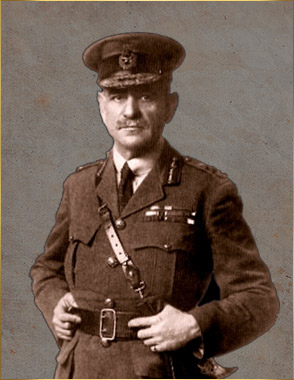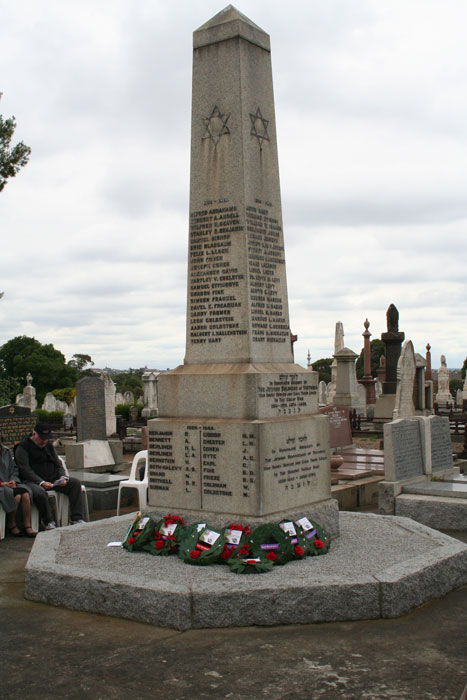Victorian Association of Jewish Ex & Servicemen & Women Australia Incorporated
Founding Member General Sir John Monash GCMG KCB VD
Barmes
Surname
Barmes
First names
David
Rank
Acting Sergeant
Service No.
1748
Date of Death
6/06/1917
Hebrew Date
16 Sivan 5677
Hebrew Date
ט״ז בְּסִיוָן תרע״ז
Age at Death
26
How Died
Died of Wounds
Where Died
France
Cemetery
Bailleul Communal Cemetery Extension, France
Service Details
301st (Mechanical Transport), 8th Company, Army Service Corps (17th Divisional Ammunition Park)
Served
Gallipoli, Western Front
Occupation
Miner
Age at Enlistment
24
Place of Enlistment
Brisbane, QLD
Locality on Enlistment
Religion
Jewish
Gender
Male
Date of Enlistment
5/10/1914
Date of Discharge
Country of Enlistment
Australia
Notes
David Barmes was born on 9 September 1890 in London England; the son of Charles Maurice (Moses) BARMES and Kate (Catherine) née ABRAHAMS. David was 18 years old when he immigrated to Australia, taking up residence in Queensland. When war broke out in 1914, David was working as a sapphire miner, David’s brother Frank was also working in Queensland as a Drapers assistant in Charleville. Frank enlisted on 24 September and David enlisted (under the name of Barnes) on 5 October at Brisbane, the brothers were to have consecutive numbers David 1748 and Frank 1747A. David was described as being 5’6” tall with brown eyes and black hair and weighting 146lbs. David gave his religion as “Jew”, interestingly, his brother Frank gave his religion as “English church”. David had served in 4th London Artillery Brigade and had joined the Port Curtis Infantry in Queensland. With prior service in the Artillery, both were assigned to 11th Australian Field Artillery Brigade and were sent by train to Victoria to complete their training. On 22 December 1914, David and Frank embarked together on the A40 HMTS "Ceramic" bound for Egypt. In Egypt they continued their training then on 14 May, embarked on the TSS "Franconia" for Gallipoli. It was hard work serving the guns at Gallipoli, every time the guns had to be moved, the job was done by hand as it was near on impossible to hook up horses to the limbers in the steep and rugged gullies of the Peninsular. On 25 August, David ran afoul of the authorities; he refused to obey an order and was awarded 28 days detention. By 27 September, David was sick and had to be evacuated to Mudros, here he was diagnosed with Enteric Fever and placed upon the hospital ship HS "Gloucester Castle" heading for Malta. On 1 October, David was admitted to St Andrews Hospital, and later transferred to St Barnabas Hospital to complete his recovery. Enteric or Typhoid Fever, as we know it, was a very serious illness that claimed many lives. Recovery was a long slow process and it wasn’t until February 1916 that David was released from hospital and boarded the Troop Ship "Surila" heading to Egypt to re-join his unit. David disembarked at Alexandria on 17 February then caught the train to Cairo, and was assigned to the Australian Overseas base before being taken on the strength of the 11th FAB, being assigned to light duties with the HQ unit at Te-el-Kebir. David remained here regaining his strength and he also undertook training to bring him up to the level of fitness required for front line duty. On 31 May he was transferred to 41st Battery of 11th FAB at Serapeum. The same day he and his unit boarded the train for Alexandria and on 1 June embarked on HMT "Haverford" sailing for Marseilles and the Western Front. Ten days later they arrived in France, finding it cool and green after the Egyptian desert. They again boarded a train for the trip to Havre, where the unit were allocated more guns and equipment and again started a training program to familiarise themselves with the new equipment and their new environment. By 4 July, they were ready and had moved to Fleurbaix, here they would provide the artillery support for the tragic battle of Fromelles. On 23 July, after the battle, they moved to Armentieres. For the remainder of the month they were engaged in shelling the German trenches around Wes Macquart. In August they moved into Belgium supporting the Australian and New Zealand Divisions around Yepre, they remained in Belgium until the beginning of November then marched for 10 days in the cold and rain until they reached their rest camp at Villers Bocage near Naours in France. From mid-November to the beginning of December, the men were rested and it was most likely during this time David and his brother Frank were granted leave to visit their family in England. No doubt their parents and siblings would have been very excited to see them both. David had three other brothers serving in the British Army, Nathan, Baron and Louis. There is a photo of David and Frank with one of their brothers; we can only assume the other two were overseas on active service at the time the photo was taken. It would have been a short visit, two weeks at the most. At the beginning of December their unit was back in action. On 12 December, David again found himself in trouble with the authorities, he failed to appear for morning parade. Being absent without leave was a serious offence. David was charged, found guilty and sentenced to three days Field Punishment No 2 (hard labour, no pay). On 23 December the 41st Battery came under heavy fire and one man was killed and the next day two were wounded. Throughout January and February, the Brigade continued supporting the attacking troops; including the South Africans at Deville Wood. The Artillery moved steadily forward with the Infantry and by the end of May, they had reached Messines, where they were subjected to gas shelling. June began with a concentrated barrage on the German trenches around Messines. Then on 5 June, the Brigade and with it the 41st Battery, were in engaged in support of the 3rd Rifle Brigade of the New Zealand Infantry as they attacked Messines. The covering barrage being laid down by the Australians attracted enemy fire and David was wounded. He was evacuated to 53rd Casualty Clearing Station but three days later on 8 June, he died of his wounds. David was buried in the Bailleul Communal Cemetery Extension; the inscription on his grave reads “Our darling son sleeps here”. When David’s family were notified of their son’s death, his father Maurice wrote to the military authorities advising them that although David had enlisted under the names Barnes, his correct name was Barmes and asked for his records to be amended, Maurice’s wishes were carried out and his medals, memorial plaque and his grave all bear the name Gunner David Barmes. For his service during the War, he was awarded the 1914-15 Star, the British War Medal and the Victory Medal. Frank and his other three brothers all survived the war.

 John Monash (Monasch) born
in Melbourne, Australia on 27 June 1865, the son of
German Polish Jewish migrants, can be researched in any
military history encyclopaedia or in fact by just
‘Googling’ his name on the internet. His history
and list of achievements are long and far too many to detail
in this brief summary. However, might I say that reading his
history is well worth the effort and I can assure you that
his deeds will amaze you. I have found that the deeds are
better labelled on more than one man and in more than one
lifetime.
John Monash (Monasch) born
in Melbourne, Australia on 27 June 1865, the son of
German Polish Jewish migrants, can be researched in any
military history encyclopaedia or in fact by just
‘Googling’ his name on the internet. His history
and list of achievements are long and far too many to detail
in this brief summary. However, might I say that reading his
history is well worth the effort and I can assure you that
his deeds will amaze you. I have found that the deeds are
better labelled on more than one man and in more than one
lifetime. An
announcement was made in the weeks leading up to the
Centenary of ANZAC by Judy Landau, President VAJEX Aust.
She stated that it gave her great delight to announce
that VAJEX Aust (Victorian Association of Jewish Ex
& Servicemen & Women Australia Inc) has
successfully raised the required funds to build a new
Victorian Jewish Memorial after the style of the
historic Memorial located in the Jewish section of the
Melbourne General Cemetery. After an extensive two year
process, Judy has single-handedly sought letters of
support, raised the funds, and obtained approval from
the City of Port Phillip.
An
announcement was made in the weeks leading up to the
Centenary of ANZAC by Judy Landau, President VAJEX Aust.
She stated that it gave her great delight to announce
that VAJEX Aust (Victorian Association of Jewish Ex
& Servicemen & Women Australia Inc) has
successfully raised the required funds to build a new
Victorian Jewish Memorial after the style of the
historic Memorial located in the Jewish section of the
Melbourne General Cemetery. After an extensive two year
process, Judy has single-handedly sought letters of
support, raised the funds, and obtained approval from
the City of Port Phillip.
